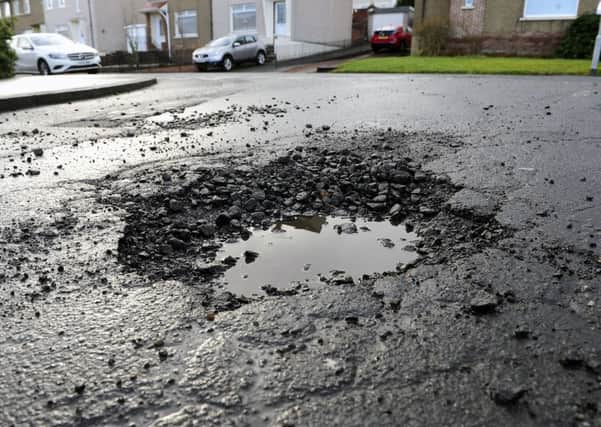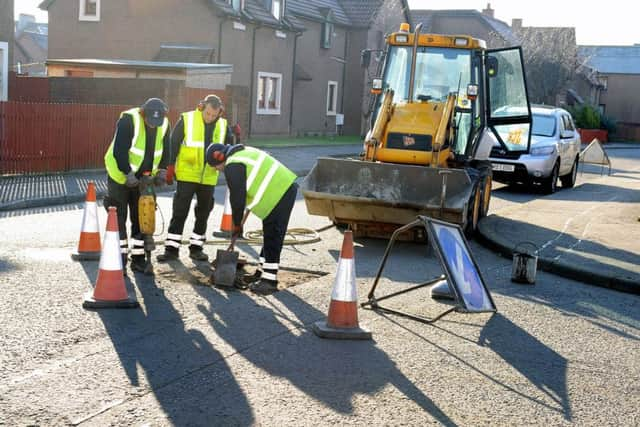It might be a while before Falkirk's potholes disappear


Much angst is directed towards the authority in charge of the upkeep of roads – Falkirk Council in this district – to get the holes filled as soon as they appear.
The council’s head of roads and design Robert McMaster agreed to meet with the Herald this week to discuss the problem and how the local authority deals with it.
Advertisement
Hide AdAdvertisement
Hide AdAccording to the latest figures, Falkirk Council has spent £58,493 on compensating motorists for damage to their vehicles caused by potholes, whilst spending almost £2 million on road repairs since the 2013/14 financial year.


Some potholes will be fixed quicker than others depending on their size, but there are “making safe” timescales the council has a duty to stick to with the most urgent being holes 10cm or bigger being repaired within 24 hours.
Those which are between 4cm and 10cm must be filled in within five working days; anything between 3-4cm is 20 days and 13mm-20mm is within the next planned programme of works to a maximum of six months.
Mr McMaster admits the council is playing catch-up on repairs at the moment blaming the weather for the extent of damage to Falkirk’s roads.
Advertisement
Hide AdAdvertisement
Hide AdWithin the last year the council has received 2316 reports of potholes with 60 per cent of these – 1391 – coming in just the last three months. A total of 1054 defect repairs, not all potholes, have been carried to date.


It takes around 20 minutes to repair a pothole on average so it would take the council 772 hours, which would equate to 110 days based on a seven-hour day, five-day working week to fix all the potholes it has to repair, and staff are working through it.
Mr McMaster said: “The overall condition of the roads is improving and has been for a number of years now. We have a road asset management plan which prioritises work to where it is needed most.
“It assesses the category of roads to the condition of it and the number of vehicles on it and you get a score out of that and we prioritise to those roads that most need it. That’s an approved plan through the council.
Advertisement
Hide AdAdvertisement
Hide Ad“Year-on-year we are improving, but the weather we’ve had over the last three to four months that created a cycle of extremely wet weather, with water lying on the roads, then periods of really cold weather, frost, so the water gets into the roads then it freezes and then it pops all the existing potholes that have been filled in over the years and creates bigger ones and crusts the edges away from those potholes.
“Sixty per cent of the potholes have been reported in the last three months so that shows the problems we are facing at the moment. The bigger the pothole and more busier the route, these are the ones that will be prioritised.
“Of course, we are doing this on top of our normal workloads.
“It’s the same guys who clear the ice and grit the roads who fill in the potholes so we’re stretched at the moment it’s fair to say, but we’re putting all the resources we can into these reactive repairs.
Advertisement
Hide AdAdvertisement
Hide Ad“The problem at this time of year is that we can’t repair a lot because of the weather so it’s much easier to handle in the summer in better weather so it will get better as time goes on.”
When is the council liable for compensation?
If your vehicle is damaged by a pothole you can claim compensation from Falkirk Council if it happened on one of its roads, however, it may not always be liable.
If the council is aware of the defect, repaired it within the legal timescale, a compensation claim is then submitted for damage between the identification of the pothole and the council fixing it, the council will have complied with its service standards.
For example, a 10cm pothole may be reported at 8am; your car is damaged by it at 1pm the same day; the council fix the pothole before 8am the next morning. The council has fulfilled its duty to repair the 10cm pothole within the required time, however, this could still be challenged in court.
Advertisement
Hide AdAdvertisement
Hide AdIn terms of road defects, the council adheres the Code of Practice for Highway Maintenance Management (Well Maintained Highways) which makes recommendations to roads authorities for the maintenance of the public road network.
Falkirk Council is investing in a spray injection patching repair machine that will operate in rural areas fixing potholes from Monday (March 7) for three weeks.
It’s anticipated that the current backlog of repairs will reduce significantly by the introduction of this type of quick repair system. There is a thermal patching machine and two hotboxes currently being used to fill holes, mainly in residential areas, at the moment.
The revenue budget the roads department uses for “reactive” repairs for the likes of potholes is being reduced by £200,000 for 2016/17, while the winter budget is to be cut by a further £150,000. These cuts will have no impact on the current year’s work. There will be a further cut of £88,000 in 2017/18.
However, the three-year capital budget approved by Falkirk Council at the end of last month does show a reinstatment of cash in year three that will make up the shortfall of the next two years.